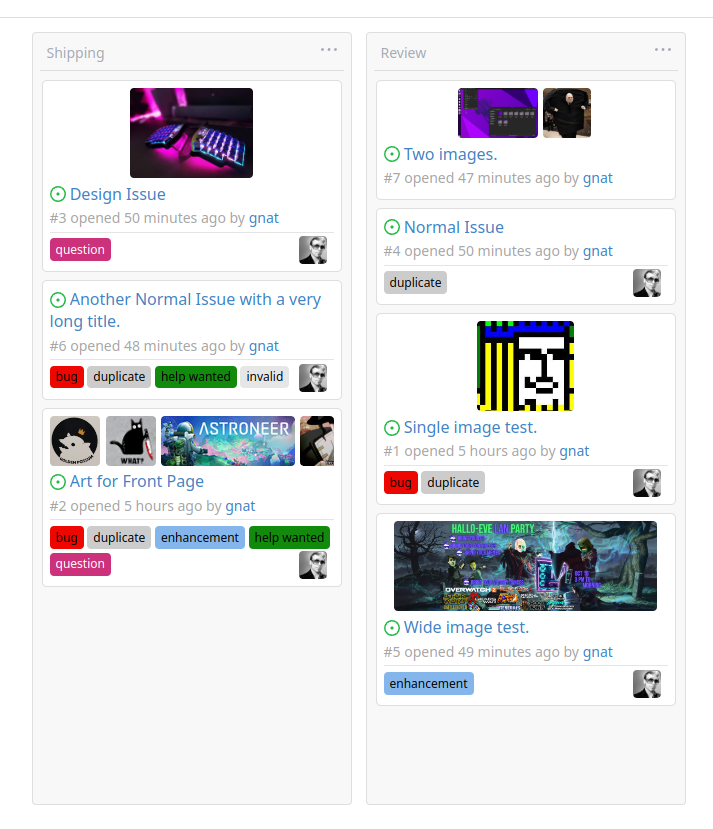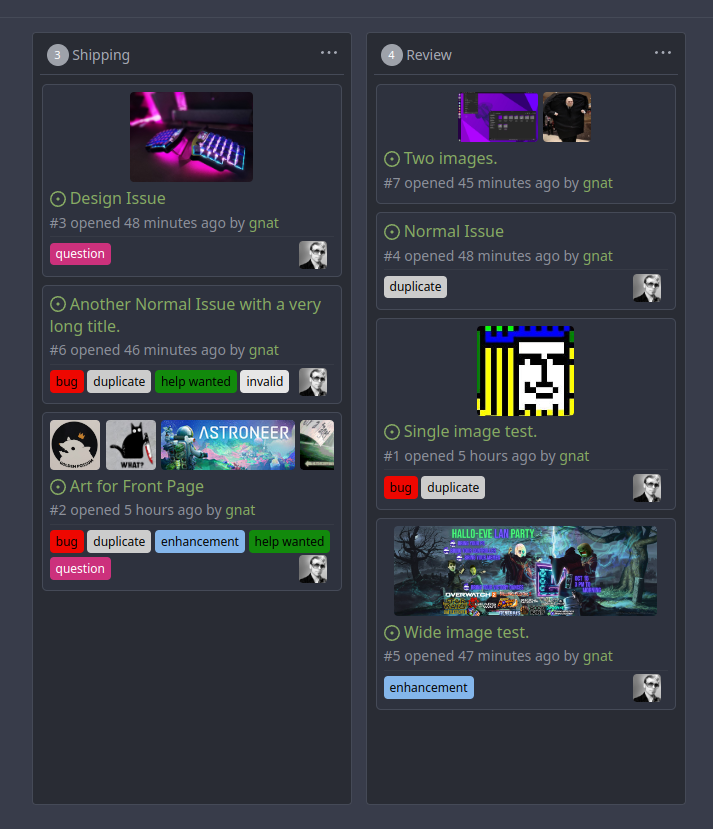Before, there was a `log/buffer.go`, but that design is not general, and
it introduces a lot of irrelevant `Content() (string, error) ` and
`return "", fmt.Errorf("not supported")` .
And the old `log/buffer.go` is difficult to use, developers have to
write a lot of `Contains` and `Sleep` code.
The new `LogChecker` is designed to be a general approach to help to
assert some messages appearing or not appearing in logs.
A part of https://github.com/go-gitea/gitea/pull/22865
At first, I think we do not need 3 ProjectTypes, as we can check user
type, but it seems that it is not database friendly.
---------
Co-authored-by: delvh <dev.lh@web.de>
Co-authored-by: Lunny Xiao <xiaolunwen@gmail.com>
Co-authored-by: 6543 <6543@obermui.de>
Replace #23350.
Refactor `setting.Database.UseMySQL` to
`setting.Database.Type.IsMySQL()`.
To avoid mismatching between `Type` and `UseXXX`.
This refactor can fix the bug mentioned in #23350, so it should be
backported.
minio/sha256-simd provides additional acceleration for SHA256 using
AVX512, SHA Extensions for x86 and ARM64 for ARM.
It provides a drop-in replacement for crypto/sha256 and if the
extensions are not available it falls back to standard crypto/sha256.
---------
Signed-off-by: Andrew Thornton <art27@cantab.net>
Co-authored-by: John Olheiser <john.olheiser@gmail.com>
Some bugs caused by less unit tests in fundamental packages. This PR
refactor `setting` package so that create a unit test will be easier
than before.
- All `LoadFromXXX` files has been splited as two functions, one is
`InitProviderFromXXX` and `LoadCommonSettings`. The first functions will
only include the code to create or new a ini file. The second function
will load common settings.
- It also renames all functions in setting from `newXXXService` to
`loadXXXSetting` or `loadXXXFrom` to make the function name less
confusing.
- Move `XORMLog` to `SQLLog` because it's a better name for that.
Maybe we should finally move these `loadXXXSetting` into the `XXXInit`
function? Any idea?
---------
Co-authored-by: 6543 <6543@obermui.de>
Co-authored-by: delvh <dev.lh@web.de>
Add a new "exclusive" option per label. This makes it so that when the
label is named `scope/name`, no other label with the same `scope/`
prefix can be set on an issue.
The scope is determined by the last occurence of `/`, so for example
`scope/alpha/name` and `scope/beta/name` are considered to be in
different scopes and can coexist.
Exclusive scopes are not enforced by any database rules, however they
are enforced when editing labels at the models level, automatically
removing any existing labels in the same scope when either attaching a
new label or replacing all labels.
In menus use a circle instead of checkbox to indicate they function as
radio buttons per scope. Issue filtering by label ensures that only a
single scoped label is selected at a time. Clicking with alt key can be
used to remove a scoped label, both when editing individual issues and
batch editing.
Label rendering refactor for consistency and code simplification:
* Labels now consistently have the same shape, emojis and tooltips
everywhere. This includes the label list and label assignment menus.
* In label list, show description below label same as label menus.
* Don't use exactly black/white text colors to look a bit nicer.
* Simplify text color computation. There is no point computing luminance
in linear color space, as this is a perceptual problem and sRGB is
closer to perceptually linear.
* Increase height of label assignment menus to show more labels. Showing
only 3-4 labels at a time leads to a lot of scrolling.
* Render all labels with a new RenderLabel template helper function.
Label creation and editing in multiline modal menu:
* Change label creation to open a modal menu like label editing.
* Change menu layout to place name, description and colors on separate
lines.
* Don't color cancel button red in label editing modal menu.
* Align text to the left in model menu for better readability and
consistent with settings layout elsewhere.
Custom exclusive scoped label rendering:
* Display scoped label prefix and suffix with slightly darker and
lighter background color respectively, and a slanted edge between them
similar to the `/` symbol.
* In menus exclusive labels are grouped with a divider line.
---------
Co-authored-by: Yarden Shoham <hrsi88@gmail.com>
Co-authored-by: Lauris BH <lauris@nix.lv>
Unfortunately #20896 does not completely prevent Data too long issues
and GPGKeyImport needs to be increased too.
Fix #22896
Signed-off-by: Andrew Thornton <art27@cantab.net>
Original Issue: https://github.com/go-gitea/gitea/issues/22102
This addition would be a big benefit for design and art teams using the
issue tracking.
The preview will be the latest "image type" attachments on an issue-
simple, and allows for automatic updates of the cover image as issue
progress is made!
This would make Gitea competitive with Trello... wouldn't it be amazing
to say goodbye to Atlassian products? Ha.
First image is the most recent, the SQL will fetch up to 5 latest images
(URL string).
All images supported by browsers plus upcoming formats: *.avif *.bmp
*.gif *.jpg *.jpeg *.jxl *.png *.svg *.webp
The CSS will try to center-align images until it cannot, then it will
left align with overflow hidden. Single images get to be slightly
larger!
Tested so far on: Chrome, Firefox, Android Chrome, Android Firefox.
Current revision with light and dark themes:


---------
Co-authored-by: Jason Song <i@wolfogre.com>
Co-authored-by: Lunny Xiao <xiaolunwen@gmail.com>
Co-authored-by: delvh <dev.lh@web.de>
This PR adds the support for scopes of access tokens, mimicking the
design of GitHub OAuth scopes.
The changes of the core logic are in `models/auth` that `AccessToken`
struct will have a `Scope` field. The normalized (no duplication of
scope), comma-separated scope string will be stored in `access_token`
table in the database.
In `services/auth`, the scope will be stored in context, which will be
used by `reqToken` middleware in API calls. Only OAuth2 tokens will have
granular token scopes, while others like BasicAuth will default to scope
`all`.
A large amount of work happens in `routers/api/v1/api.go` and the
corresponding `tests/integration` tests, that is adding necessary scopes
to each of the API calls as they fit.
- [x] Add `Scope` field to `AccessToken`
- [x] Add access control to all API endpoints
- [x] Update frontend & backend for when creating tokens
- [x] Add a database migration for `scope` column (enable 'all' access
to past tokens)
I'm aiming to complete it before Gitea 1.19 release.
Fixes #4300
This PR adds a task to the cron service to allow garbage collection of
LFS meta objects. As repositories may have a large number of
LFSMetaObjects, an updated column is added to this table and it is used
to perform a generational GC to attempt to reduce the amount of work.
(There may need to be a bit more work here but this is probably enough
for the moment.)
Fix #7045
Signed-off-by: Andrew Thornton <art27@cantab.net>
Previously, there was an `import services/webhooks` inside
`modules/notification/webhook`.
This import was removed (after fighting against many import cycles).
Additionally, `modules/notification/webhook` was moved to
`modules/webhook`,
and a few structs/constants were extracted from `models/webhooks` to
`modules/webhook`.
Co-authored-by: 6543 <6543@obermui.de>
Co-authored-by: Lunny Xiao <xiaolunwen@gmail.com>
Some dbs require that all tables have primary keys, see
- #16802
- #21086
We can add a test to keep it from being broken again.
Edit:
~Added missing primary key for `ForeignReference`~ Dropped the
`ForeignReference` table to satisfy the check, so it closes #21086.
More context can be found in comments.
Signed-off-by: Andrew Thornton <art27@cantab.net>
Co-authored-by: zeripath <art27@cantab.net>
Close #14601
Fix #3690
Revive of #14601.
Updated to current code, cleanup and added more read/write checks.
Signed-off-by: Andrew Thornton <art27@cantab.net>
Signed-off-by: Andre Bruch <ab@andrebruch.com>
Co-authored-by: zeripath <art27@cantab.net>
Co-authored-by: 6543 <6543@obermui.de>
Co-authored-by: Norwin <git@nroo.de>
Co-authored-by: Lunny Xiao <xiaolunwen@gmail.com>
`hex.EncodeToString` has better performance than `fmt.Sprintf("%x",
[]byte)`, we should use it as much as possible.
I'm not an extreme fan of performance, so I think there are some
exceptions:
- `fmt.Sprintf("%x", func(...)[N]byte())`
- We can't slice the function return value directly, and it's not worth
adding lines.
```diff
func A()[20]byte { ... }
- a := fmt.Sprintf("%x", A())
- a := hex.EncodeToString(A()[:]) // invalid
+ tmp := A()
+ a := hex.EncodeToString(tmp[:])
```
- `fmt.Sprintf("%X", []byte)`
- `strings.ToUpper(hex.EncodeToString(bytes))` has even worse
performance.
Change all license headers to comply with REUSE specification.
Fix #16132
Co-authored-by: flynnnnnnnnnn <flynnnnnnnnnn@github>
Co-authored-by: John Olheiser <john.olheiser@gmail.com>
Unfortunately #21549 changed the name of Testcases without changing
their associated fixture directories.
Fix #21854
Signed-off-by: Andrew Thornton <art27@cantab.net>
Co-authored-by: Lunny Xiao <xiaolunwen@gmail.com>
_This is a different approach to #20267, I took the liberty of adapting
some parts, see below_
## Context
In some cases, a weebhook endpoint requires some kind of authentication.
The usual way is by sending a static `Authorization` header, with a
given token. For instance:
- Matrix expects a `Bearer <token>` (already implemented, by storing the
header cleartext in the metadata - which is buggy on retry #19872)
- TeamCity #18667
- Gitea instances #20267
- SourceHut https://man.sr.ht/graphql.md#authentication-strategies (this
is my actual personal need :)
## Proposed solution
Add a dedicated encrypt column to the webhook table (instead of storing
it as meta as proposed in #20267), so that it gets available for all
present and future hook types (especially the custom ones #19307).
This would also solve the buggy matrix retry #19872.
As a first step, I would recommend focusing on the backend logic and
improve the frontend at a later stage. For now the UI is a simple
`Authorization` field (which could be later customized with `Bearer` and
`Basic` switches):

The header name is hard-coded, since I couldn't fine any usecase
justifying otherwise.
## Questions
- What do you think of this approach? @justusbunsi @Gusted @silverwind
- ~~How are the migrations generated? Do I have to manually create a new
file, or is there a command for that?~~
- ~~I started adding it to the API: should I complete it or should I
drop it? (I don't know how much the API is actually used)~~
## Done as well:
- add a migration for the existing matrix webhooks and remove the
`Authorization` logic there
_Closes #19872_
Co-authored-by: Lunny Xiao <xiaolunwen@gmail.com>
Co-authored-by: Gusted <williamzijl7@hotmail.com>
Co-authored-by: delvh <dev.lh@web.de>
The OAuth spec [defines two types of
client](https://datatracker.ietf.org/doc/html/rfc6749#section-2.1),
confidential and public. Previously Gitea assumed all clients to be
confidential.
> OAuth defines two client types, based on their ability to authenticate
securely with the authorization server (i.e., ability to
> maintain the confidentiality of their client credentials):
>
> confidential
> Clients capable of maintaining the confidentiality of their
credentials (e.g., client implemented on a secure server with
> restricted access to the client credentials), or capable of secure
client authentication using other means.
>
> **public
> Clients incapable of maintaining the confidentiality of their
credentials (e.g., clients executing on the device used by the resource
owner, such as an installed native application or a web browser-based
application), and incapable of secure client authentication via any
other means.**
>
> The client type designation is based on the authorization server's
definition of secure authentication and its acceptable exposure levels
of client credentials. The authorization server SHOULD NOT make
assumptions about the client type.
https://datatracker.ietf.org/doc/html/rfc8252#section-8.4
> Authorization servers MUST record the client type in the client
registration details in order to identify and process requests
accordingly.
Require PKCE for public clients:
https://datatracker.ietf.org/doc/html/rfc8252#section-8.1
> Authorization servers SHOULD reject authorization requests from native
apps that don't use PKCE by returning an error message
Fixes #21299
Co-authored-by: wxiaoguang <wxiaoguang@gmail.com>
Co-authored-by: Lunny Xiao <xiaolunwen@gmail.com>
When actions besides "delete" are performed on issues, the milestone
counter is updated. However, since deleting issues goes through a
different code path, the associated milestone's count wasn't being
updated, resulting in inaccurate counts until another issue in the same
milestone had a non-delete action performed on it.
I verified this change fixes the inaccurate counts using a local docker
build.
Fixes #21254
Co-authored-by: Lunny Xiao <xiaolunwen@gmail.com>